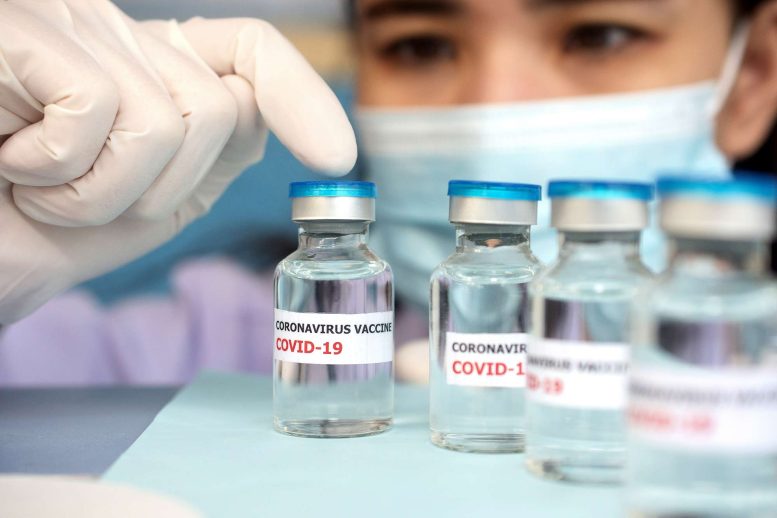
A team of University of Michigan researchers analyzed more than 80 studies to assess the effectiveness of Covid-19 vaccine doses beyond the primary series. Their findings, based on observations of 150 million patients, support the efficacy of monovalent and bivalent boosters in preventing severe outcomes and underscore the importance of annual vaccine updates.
New research highlights the significant benefits of monovalent and bivalent COVID-19 It is promising in preventing hospitalizations and deaths, recommending periodic updating of applicable vaccines in circulation Virus Variations.
First boosters, second boosters, monovalent, bivalent. as well as Sars-Cove-2 The strain of the virus, the vaccines to fight the virus, are always changing – perhaps confusingly.
With the goal of better understanding the different types of vaccines, their efficacy, and the methods used worldwide to study vaccine effectiveness, a team of University of Michigan researchers led by Sabir Meeh and Pramar Mukherjee conducted about 80 studies and 150 evaluations. Millions of observations from patient datasets around the world to understand the different designs and methods used to study the efficacy of Covid-19 vaccine doses following primary series vaccination.
They applied all the methods used in those studies to Michigan Medicine's patient data.
Meeh is an alumnus of the School of Public Health with a master's degree in biostatistics and is currently a biostatistician in urology at Michigan Medicine. Mukherjee, John D. Kalpfleisch is the University Distinguished Professor of Biostatistics, Siobhan Harlow Collegiate Professor of Public Health, and Assistant Vice President for Research in the Office of the Vice President for Research.
“What we've been able to develop is a repository of methods that can be used for future annual vaccinations,” Mukherjee said. “Robust and reproducible results and reliable estimates of vaccine efficacy are important to ensure public confidence and combat misinformation.”
Their full review is available Scientific advances. Meeh explains further.
From the patient data you reviewed, can you explain your findings about bivalent and monovalent boosters?
In our study, we evaluated three different vaccine regimens: 1) a monovalent booster targeting the original strain, 2) a second monovalent booster with the original formulation, and 3) a new bivalent vaccine updated in fall 2022 to target the new Omicron strains. We found that all consecutive doses provided substantial benefit in preventing hospitalizations and deaths, and estimates of Omicron-specific vaccine dose declines by 2022 were robust from global studies.
These findings support the practice of periodically updating COVID-19 vaccines for variants currently in circulation. Fortunately, in the United States and many other countries, such as those in the European Union, we receive updated COVID-19 vaccines at an annual frequency. The fall 2022 vaccine has already been succeeded by a new updated vaccine in fall 2023, which you can still get in early 2024 if you haven't already, targeting the new XBB1.5 Omicron variant.
We expect our results regarding the benefit of updating vaccines to be generalizable to any updated COVID-19 vaccine, not just the fall 2022 bivalent vaccine, but further monitoring and study of the real-world effectiveness of the annual vaccine is still necessary. We hope that the findings of our research will help these studies. What we were able to do was establish an analytical pipeline through which researchers could examine the vaccine efficacy of future annual vaccine formulations.
Can you describe what biostatistics brings to the table on this topic?
The science of biostatistics and epidemiology provides a toolbox for the complex process of evaluating vaccine efficacy in observational studies. However, there are many different approaches—both in study design and methods—that researchers have used in vaccine efficacy studies conducted around the world, which prompted us to conduct our review of their methodology and results and subsequent case studies. These methods use the Michigan Clinic data.
Most fortunately, a key finding of our study is that estimates of vaccine effectiveness are relatively stable and do not depend heavily on the choice of methods for outcomes such as hospitalization and mortality. We did not observe this favorable characteristic for infection outcomes, but hospitalization and mortality are important study points as we progress further into the endemic stage of the epidemic.
What does your research tell us about the power of COVID-19 boosters to prevent severe illness and hospitalizations, and what do you want to convey to the public with this study?
The Covid-19 vaccines tested in our study, including the Fall 2022 bivalent vaccine, provided strong protection against hospitalization and death. We expect this pattern to continue with additional annual vaccines approved by the FDA, but continued study of future vaccines is warranted, and our findings provide some important points for these future studies.
Reference: “Design and Analytical Diversity in Observational Studies of COVID-19 Booster Efficacy: A Review and Case Study” Sabir Meeh, Xu Shi, Lars G. Fritsch, Maxwell Salvador, Abram Wagner, Emily D. Martin and Pramar Mukherjee, 20 December 2023, Scientific advances.
DOI: 10.1126/sciadv.adj3747
Co-authors: Xu Shi, Lars Fritsche, Maxwell Salvatore, Abram Wagner, Emily Martin, all of UM. Their cross-disciplinary collaboration is part of the School of Public Health's Initiative on Ideas, Interdisciplinary Discovery, Engagement + Community.